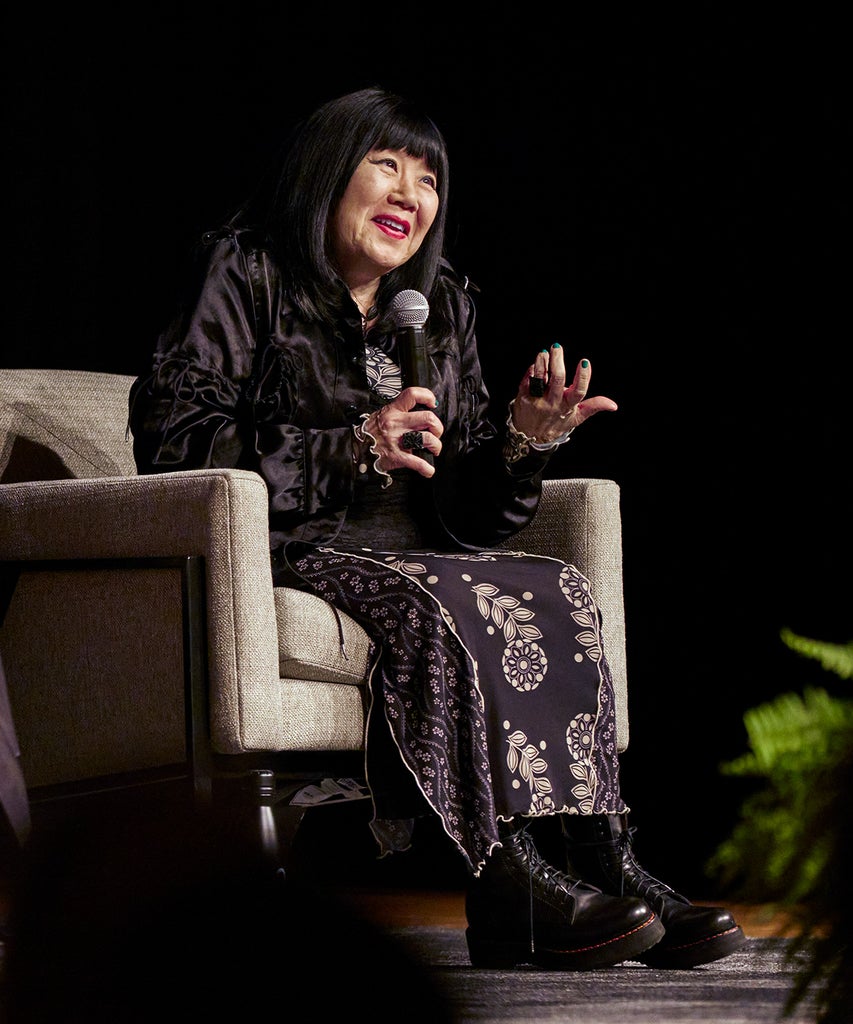
I meet Anna Sui hours before she’s due to speak to an auditorium full of hundreds of eager students at SCADstyle, Savannah College of Art & Design’s annual design summit. So naturally I have to ask her: What was she like in school? “I went [to school] in New York in the mid ’70s, at the height of punk rock, and I was out every night,” she laughs. “So that could tell you what kind of student I was.”
In fact, Sui, who was born and raised in the suburbs of Detroit, MI, left after her second year studying fashion at Parsons School of Design in New York to work with her close friend Steven (for everyone else, legendary photographer Steven Meisel). Shortly after, in 1981, she launched her eponymous label, eventually doing her first runway show in 1991 featuring Linda Evangelista and Naomi Campbell, and winning the Council of Fashion Designers of America (CFDA) Perry Ellis award for new talent two years later. “I’ve worked since I left school. And I think that I learned so much more actually working.”
Along the way, she’s piled up accolades and headlines for her vibrant, party-punk-meets-afternoon-picnic collections. In 2009 she received the CFDA Geoffrey Beene Lifetime Achievement Award and her body of work has been featured at the Museum at the Fashion Institute of Technology as well as London’s Fashion and Textile Museum. Her products can be shopped in over 30 countries and she’s done more collaborations than Drake.
But at heart she’s still that little girl who dreamed of being a fashion designer, that teenager making her own clothes, that twentysomething who lost it when Madonna wore her dress at Paris Fashion Week in the early ’90s. “I’m just so blessed to be doing what I love,” she says. “I think that I see that in the students, that they’re really doing what they love and they’re pouring everything into it.”
You’ve been in the industry for decades. What motivates you about fashion today? I love clothes. It’s the most exciting thing to realize there’s a new trend and to see how people are putting themselves together. Every time you see something like that, it spurs more ideas — like, how would I interpret that? As much as it’s a really hard business, I’m like a magpie. As soon as I see a piece of fabric or see a trend, it’s just like, ooh…just on it.
Now there’s a new way to do things. And that always spurs on much more creativity, when there’s a new way to do things.
Anna Sui
Where do you find inspiration? It’s everywhere. And it can come from the simplest things. I’ll see something on TV. Or I’ll read something in a magazine or in a book and explore it. My last collection was inspired by the Peppermint Lounge [in New York City]. I saw a picture of my friend Jane Holzer there, dancing in head-to-toe Chanel couture. I asked her where she was and I googled it and started seeing who went to the Peppermint Lounge in the early ’60s. And it was all: The Beatles with all their wives. The Rolling Stones. The Ronettes. Every movie star; every politician. Jackie Kennedy. All the rich and famous went there.
How do you avoid the trap of burnout that many designers can feel after putting out collection after collection, season after season? I’m very disciplined, and I think that designers are one of the few creative people that have to create on schedule and so it’s that fear of, Oh my god, I have a collection to do. What is going to be the theme? What’s the color story? I start being overanxious about it. And suddenly something will click and it can come to you any time or you’ll just see one thing that will spark a thought. But you have to trust your instinct with the process. So I start putting pictures on the wall or a color that I like, or if I’ve seen a print that I like. I build my whole collection on my inspiration board, they’re quite involved and extensive and very personal… It helps me go on that journey of what I’m trying to express.
You also choose some really incredible collaborators, most recently Marc Jacobs on the limited reissue for Heaven. Who’s your next dream collaborator? That’s a hard one because I’ve worked with so many of my idols. Yeah, you know, I did one with Kansai Yamamoto. I did one with Zandra Rhodes. I’ve done Hello Kitty. So it’s really been in my DNA to be able to work with all these different characters and real people and other design houses. I used to always say, I wish I could do Pucci. I wish I could do Missoni. I wish I could do Chanel.
Any up-and-coming designers you’re loving? There’s Susan Wong; she’s Chinese and she does these beautifully, very intricate, kind of appliqué flowers with chiffon. Her work is just incredible. Collina Strada I think is amazing. Now is such a great time for young designers because our whole industry has exploded and it’s kind of starting from scratch again. Now’s the time where you can really be creative with not only your process but also your target audience and the way you manufacture. I don’t think it has to be done now in the hubs like New York or L.A., it can be done anywhere. And I think that in the next five years, we’re gonna see fashion really change.
Is that exciting or terrifying? Both. I had so much security from that kind of structure. But now there’s a new way to do things. And that always spurs on much more creativity, when there’s a new way to do things.
This interview has been edited and condensed for clarity.
Like what you see? How about some more R29 goodness, right here?
Top Fashion Trends For Spring 2023

No comments:
Post a Comment